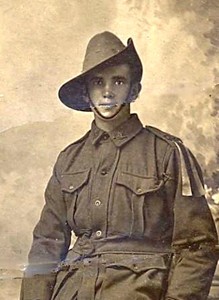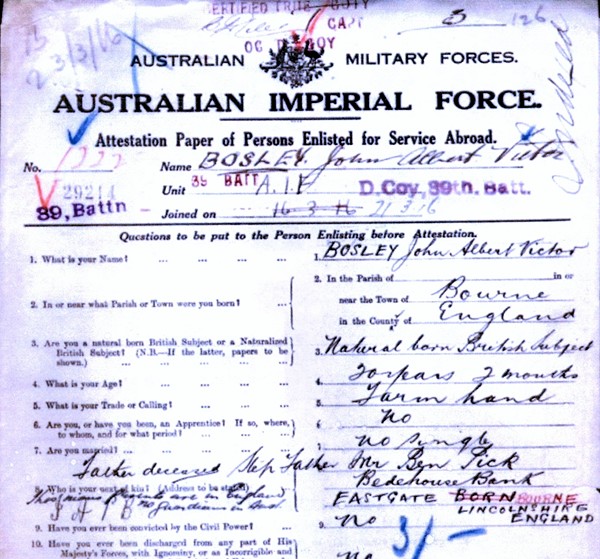|
1222 Private Victor Bosley
A young man who had emigrated to
Australia only a few years before was among those killed during the
Great War. John Albert Victor Bosley was a Bourne lad, the son of
Henry and Ellen Bosley, who had been working as a farm hand but in
1913, then aged 17, he sailed for Australia aboard the steamship
Hawkes Bay.
When the war broke out in 1914, he volunteered for
the army and after being rejected twice, he was eventually accepted
and enlisted at Thomastown near Melbourne, Victoria, on March 16th
and was assigned to D
Company of the 39th Battalion, the Australian
Imperial Force, and trained as a despatch rider. |
 |
Both his father and grandfather had served in the army and there is
evidence that Victor felt it was a family duty to join up because he wrote
home to his mother: “Somebody must come and fight for you and I would
sooner be shot than called a coward.”
Ironically, he was posted back to England for further training at Larkhill
Camp
in Wiltshire and in the summer of 1916, returned to his home town to visit
his mother and step-father. The following year he was serving in Belgium with II Anzac
Corps and tragically, he was killed on 4th October 1917 during the Battle of Passchendale. He was 21 years old.
Victor’s father had been working as a porter at the railway station in
Peterborough in 1902 when he was killed by an express train as
he was about to uncouple an engine and his mother was married again to Ben
Pick and they were living in Bedehouse Bank, Eastgate, Bourne. She
suggested to several local football enthusiasts that she would like her
son to be remembered with a shield which she would present for an annual
competition among boys’ teams from the locality aged under 16 and
accordingly, an inaugural meeting was held at the Bull Hotel (now the
Burghley Arms) on 25th November 1920. The idea was well received and it
was resolved that the trophy would be known as the Victor Bosley Shield
and bear the inscription: “Presented by his mother in remembrance of her
son who was killed in the Great War, 4th October 1917.”
The clubs competing that year came from Ryhall, Castle Bytham, Corby Glen,
South Witham, Billingborough and Dowsby, and Bourne Juniors who became the
first winners, the final being played at the Abbey Lawn on 1st September
1921, the team being W Hinson, G Everett, J H Moody, F Rosier, A Dibben, J
Sones, T Colman, P Sensicle, N Hinson, F Hinson, A Cropley, J Luesby, A
Hemment, R Cropley, T Dewey, C Smith and C Twell.
The competition continued successfully until the outbreak of the Second
World War in 1939 but was suspended until the cessation of
hostilities in 1945 when it was revived with Bourne Youth Association
winning the trophy for the 1945-46 season from an entry of nine teams.
The shield measures 15 inches wide by 20
inches deep and is made of wood with a beaten copper panel depicting a
soccer match in the centre and surrounded by small silver plaques giving
the names of the winners from that first year until the final season of
presentation in 1999-2000 (Deeping Rangers). Other winners have included
Peterborough Lincoln Road Old
Boys (1932-33), Morton Juniors (1948-49), Quadring Juniors (1949-50),
Folkingham Juniors (1971-72) and Bourne Property Services Junior Football
Club (1997-98). It was awarded a total of 66 times but not all of the
winners' names are on silver plaques. One or two are on sticky paper,
perhaps because funds did not run to the additional expenditure that year.
The most successful season must have been in 1948-49 when the takings at
the final tie between Morton Juniors and Colsterworth Juniors at the Abbey
Lawn amounted to almost £57 but as the game ended in a draw, a replay was
necessary and this added a further £64 to the grand total of over £121,
and after various donations to the finalists and the competing clubs, the
money was given to three local hospitals, the Bourne, the Butterfield and
Stamford.
|
THE VICTOR BOSLEY SHIELD
The trophy was presented by Mrs Ellen Pick in
1920 in memory of her son, Private John Albert Victor Bosley, who
was killed during the Battle of Passchendale on 4th October 1917. |
 |
Many well known sportsmen began their careers in this competition, among
them Eric Houghton, the former Billingborough schoolboy who went on to
play for Notts County, Aston Villa and was capped for England, Chris Woods
who played for Glasgow Rangers, Sheffield Wednesday and England and Peter
Grummitt who was a Nottingham Forest goalkeeper for many seasons.
In more recent years, the competition struggled to survive, always prey to
outside influences such as full league programmes, other competitions and
a backlog of games caused by inclement weather and the age group was
amended from 16 year olds to under 14s in an attempt to encourage more
entrants.
The competition continued until the 2000-01 season but the writing was on
the wall and it became impossible to carry on because of lack of support
and dwindling funds.
It was a sad decision particularly for Philip (Ben) Casey of Mill Drove,
Bourne, leading member of the organising committee because he is a direct
descendent of Victor Bosley who was his great uncle. It was decided that
the shield should go to the Heritage Centre in South Street for
safe-keeping and public display but there is always the hope that it might
be coming back into use. “The competition has never been formally
terminated”, he said. "Mothballed might be a better word and there is
always the hope that it may be revived in the future - 2017 seems like a
good year to mark the centenary of Victor Bosley's death.”
Meanwhile, Victor Bosley is remembered elsewhere because he is commemorated on the Menin Gate Memorial at Ypres
in Belgium along with 54,000 British and Commonwealth
soldiers who have no marked graves and his name is also included in the
Roll of Honour of Australia at the Memorial War Museum in Canberra and
also appears on the war memorial in Bourne.

Victor Bosley's enlistment form
WRITTEN OCTOBER 2009
See also
Bourne Town Football Club
Return to
The War Memorial

Go to:
Main Index Villages
Index
|


